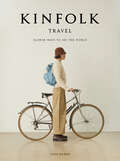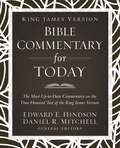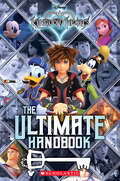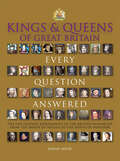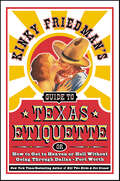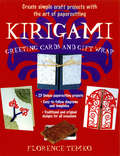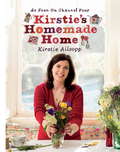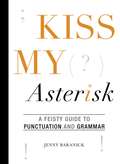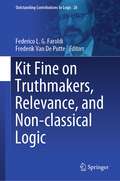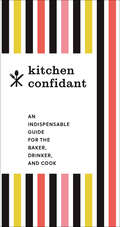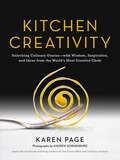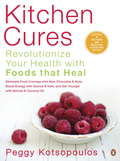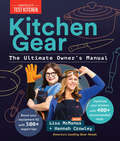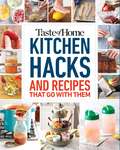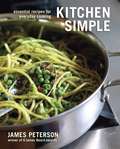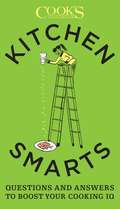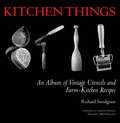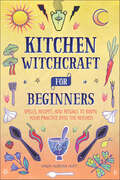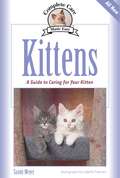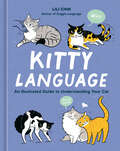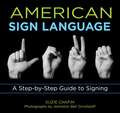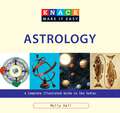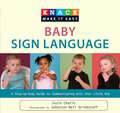- Table View
- List View
Kinfolk Travel: Slower Ways to See the World (Kinfolk)
by John BurnsExplore the art of mindful travel with Kinfolk, the pioneers in &“slow living,&” their philosophy of simplicity, authenticity, intentionality and community. With nearly 450,000 copies in print, the Kinfolk series has applied this philosophy to entertaining (The Kinfolk Table), interior design (The Kinfolk Home), and living with nature (The Kinfolk Garden). Now they have turned their attention to &“slow travel,&” offering readers a road map for planning trips that foster meaningful connections with local people and authentic experiences of local culture. Go museum hopping in Tasmania, or birdwatching in London. Explore the burgeoning fashion community in Dakar. Take a bicycle tour through Idaho, or a train trip from Oslo to Bergen. Drawing on the magazine&’s global community of writers and photographers, Kinfolk Travel takes readers to over 20 location across five continents, with travel tips from locals, stunning images, and thoughtful essays.
King James Version Bible Commentary for Today: The most up-to-date commentary on the time-honored text of the King James Version
by Thomas NelsonEvery generation seeks to apply the Bible's timeless truth about God to its context. The King James Version Bible Commentary for Today is just that--the most up-to-date commentary on the time-honored text of the King James Version written by a trusted team of conservative scholars. This volume approaches the Bible with humility and respect as they explore its meaning for our generation.The King James Version Bible Commentary for Today provides readers and students of the Bible with clear explanations of the antiquated English vocabulary of the King James text as well as the Hebrew, Aramaic, and Greek words that form the original languages of the Bible. It also focuses on the intended meaning of the original authors, providing linguistic, historical, and archaeological insights that illuminate the biblical text for seasoned and new Bible readers.Features include:New material by respected scholarsThe best in conservative scholarship from multiple denominationsIlluminating verse-by-verse expositions that shed light on the meaning of ScriptureNontechnical and jargon free--no need to know Hebrew or Greek14 maps help readers understand the world of the Old Testament and New Testament
Kingdom Hearts: The Ultimate Handbook
by Conor LloydA guide to some of the most important characters in the Kingdom Hearts series. Includes fold-out poster!From Sora and Xehanort to Donald, Goofy, King Mickey, and a wide variety of other characters, this handbook provides an overview on some of the most iconic characters in this incredible gaming franchise. Plus, it comes with a fold-out poster! It's a must-have for fans of the Kingdom Hearts series.
Kings & Queens of Great Britain: Every Question Answered
by David SoudFrom the House of Wessex to the House of Windsor, follow the pageant of personalities that have made Great Britain what it is today. Fascinating biographies of the British monarchs from the time of Roman Brittania to present day answer your every question about the country&’s aristocracy. Details of the kings&’ and queens&’ personalities are the focus, with a timeline across the bottom relating the major events of their reigns. Also included is a section devoted to royal edicts. All the Edwards, Richards, Henrys, and Williams are represented—along with outstanding personalities such as Lady Jane Grey and Oliver Cromwell—a king in all but name. This is essential reading for all Anglophiles, so brew a pot of tea and dig into the history!
Kinky Friedman's Guide to Texas Etiquette: Or How to Get to Heaven or Hell Without Going Through Dallas-Fort Worth
by Kinky FriedmanWell, butter my butt and call me a biscuit! Delivering belly laughs, hee-haws, and downright slackjaw amazement, this hilarious guide to the homeland of George W. and Willie Nelson is the essential how-to for surviving in the Lone Star State. From strange Texas laws and the history of Dr. Pepper to "Texas Talk" (in which a "turd floater" is a heavy downpour) and final-meal requests by death row inmates, Kinky Friedman, "the oldest living Jew in Texas who doesn't own any real estate," provides an insider's guide that will be loved by native Texans and the rest of us poor devils alike.Even if you don't know the difference between an Aggie and an armadillo -- or what's really in the back on Willie Nelson's tour bus -- you can pass for a Texan with the Kinkster's expert coaching. So grab your hairspray and the keys to the Cadillac and get reading!
Kirigami Greeting Cards and Gift Wrap
by Florence TemkoThis book explores the Japanese art of paper cutting through a collection of kirigami greeting cards and gift wraps from well-known craft author and expert Florence Temko. The projects in this book provide great ideas for every occasion, with Heart Variations For Your Valentine, Pop-ups, Dress-up Paper Dolls, Gift Box Borders, Woven Gift Wrap, Appliqued Gift Bag, and many, many more! The projects and simple instructions will appeal to anyone who crafts for fun or as an activity.This is a wonderful book for anyone who enjoys creating with their hands. Renowned origami artist Florence Temko fills this book with truly unforgettable projects.
Kirstie's Homemade Home
by Kirstie Allsopp'This book is packed with achievable ways to transform your house into a home that reflects you and the things you value, plus lots of gorgeous craft projects to try yourself. Welcome to my world.' Kirstie Allsopp Be inspired to create a home that reflects you and the things that you love with the help of Kirstie's Homemade Home. Nothing compares with the pleasure and satisfaction of making something yourself and Kirstie shows just how easy it can be. Drawing on the advice and enthusiasm of a host of craft experts, Kirstie shows how to personalise your home and create your own gifts with simple and practical step-by-step projects. From stencilling wallpaper and sewing your own cushions and quilts, to making candles and soap and icing a cake, Kirstie's Homemade Home includes everything you need to get to get you started. Packed with advice on how to find a style that reflects you as well as Kirstie's own little black book of shops and websites that have helped her to transform her own home, Kirstie's Homemade Home is for everyone who loves car boot sales and antiques and values the art of the homemade.
Kirstie's Homemade Home
by Kirstie Allsopp'This book is packed with achievable ways to transform your house into a home that reflects you and the things you value, plus lots of gorgeous craft projects to try yourself. Welcome to my world.' Kirstie Allsopp Be inspired to create a home that reflects you and the things that you love with the help of Kirstie's Homemade Home. Nothing compares with the pleasure and satisfaction of making something yourself and Kirstie shows just how easy it can be. Drawing on the advice and enthusiasm of a host of craft experts, Kirstie shows how to personalise your home and create your own gifts with simple and practical step-by-step projects. From stencilling wallpaper and sewing your own cushions and quilts, to making candles and soap and icing a cake, Kirstie's Homemade Home includes everything you need to get to get you started. Packed with advice on how to find a style that reflects you as well as Kirstie's own little black book of shops and websites that have helped her to transform her own home, Kirstie's Homemade Home is for everyone who loves car boot sales and antiques and values the art of the homemade.
Kiss My Asterisk: A Feisty Guide to Punctuation and Grammar
by Jenny BaranickGrammar has finally let its hair down! Unlike uptight grammar books that overwhelm us with every single grammar rule, Kiss My Asterisk is like a bikini: it’s fun, flirty, and covers only the most important bits. Its lessons, which are 100 percent free of complicated grammar jargon, have been carefully selected to include today’s most common, noticeable errors-the ones that confuse our readers or make them wonder if we are, in fact, smarter than a fifth grader. What is the proper use of an apostrophe? When should an ellipsis be used instead of an em dash? Why do we capitalize President Obama but not "the president”? And why is that question mark placed outside of the end quote?Author Jenny Baranick is an English professor whose students can’t believe she’s actually that into grammar. Upon experiencing the joys of grammar at an early age, raising grammar awareness became Jenny’s raison d’être. By spreading her remarkably user-friendly and hilarious approach to grammar, she hopes everyone will experience the satisfaction of a properly placed comma, a precisely used semicolon, and a correctly deployed en dash.Kiss My Asterisk shows grammar as it’s never been seen before: uncomplicated, laugh-out-loud funny, and, dare we say, a little risqué.
Kit Fine on Truthmakers, Relevance, and Non-classical Logic (Outstanding Contributions to Logic #26)
by Federico L. G. Faroldi Frederik Van De PutteThis book explores some of Kit Fine's outstanding contributions to logic, philosophy of language, philosophy of mathematics, and metaphysics, among others.Contributing authors address in-depth issues about truthmaker semantics, counterfactual conditionals, grounding, vagueness, non-classical consequence relations, and arbitrary objects, offering critical reflections and novel research contributions.Each chapter is accompanied by an extensive commentary, in which Kit Fine offers detailed responses to the ideas and themes raised by the contributors. The book includes a brief autobiography and exhaustive list of his publications to this date. This book is of interest to logicians of all stripes and to analytic philosophers more generally.
Kitchen Confidant: An Indispensable Guide for the Baker, Drinker, and Cook
by Chronicle BooksThe go-to adulting book for food and beverages—from pasta shapes, to beer styles, to basic knife techniques, and much, much more.This handy reference is the perfect partner for anyone who loves to bake, cook, or whip up a cocktail. Armed with the wealth of helpful reference material in this invaluable guide—including weight-to-volume conversions, the basics of stocking a baker’s tool kit, tips on where to store things in the fridge, and more—home cooks will learn to be more confident, competent, and efficient in the kitchen. Featuring separate sections for baking, drinking, and cooking, this is a must-have resource for both seasoned chefs and new cooks.
Kitchen Creativity: Unlocking Culinary Geniuswith Wisdom, Inspiration, and Ideas from the World's Most Creative Chefs
by Karen Page"Utter genius... If Leonardo da Vinci wrote a book on culinary creativity in 2017, this would be it." - Michael Gelb, New York Times bestselling author of How to Think Like Leonardo da VinciUnlock your creative potential with the world's most imaginative chefs.In this groundbreaking exploration of culinary genius, the authors of The Flavor Bible reveal the surprising strategies great chefs use to do what they do best. Beyond a cookbook, Kitchen Creativity is a paradigm-shifting guide to inventive cooking (without recipes!) that will inspire you to think, improvise, and cook like the world's best chefs.Great cooking is as much about intuition and imagination as it is about flavor and technique. Kitchen Creativity distills brilliant insights into these creative processes from more than 100 top restaurant kitchens, including the Bazaar, Blue Hill,Daniel, Dirt Candy, Eleven Madison Park and the NoMad, Gramercy Tavern, the Inn at Little Washington, Le Bernardin, Oleana, Rustic Canyon, Saison, Single Thread, and Topolobampo.Based on four years of extensive research and dozens of in-depth interviews, Kitchen Creativity illuminates the method (and occasional madness) of culinary invention. Part I reveals how to learn foundational skills, including how to appreciate, taste, and season classic dishes (Stage 1: Mastery), before reinventing the classics from a new perspective (Stage 2: Alchemy). Einstein's secret of genius-combinatory play-pushes chefs to develop unique creations and heighten their outer and inner senses (Stage 3: Creativity). Part II's A-to-Z entries are an invaluable culinary idea generator, with exercises to prompt new imaginings.You'll also discover:experts' criteria for creating new dishes, desserts, and drinks;comprehensive seasonality charts to spark inspiration all year long;how to season food like a pro, and how to create complex yet balanced layers of flavor;the amazing true stories of historic dishes, like how desperate maitre d' "Nacho" Anaya invented nachos; andproven tips to jump-start your creative process.The ultimate reference for culinary brainstorming, Kitchen Creativity will spur your creativity to new heights, both in the kitchen and beyond.
Kitchen Cures
by Peggy KotsopoulosIn Kitchen Cures, television personality and holistic nutritionist Peggy Kotsopoulos shows you how to alleviate common health conditions with a diet that’s rich in flavor and nutrient-dense whole foods. Whether you have low energy, excess belly fat that you just can’t lose or are suffering from conditions triggered by inflammation, or countless other health issues, Kitchen Cures is a unique resource that makes the simple connection between food and how you look and feel. You don’t have to overhaul your entire lifestyle or follow a rigid diet regime for weeks. Instead, Kitchen Cures offers you simple and easy-to-implement solutions to relive a host of symptoms and conditions. In each chapter, Peggy explains the health condition and what’s going on, key nutrients your body may be missing, and top nutrient-dense foods that will alleviate those symptoms. Kitchen Cures includes delicious, easy-to-make recipes that takes the guesswork out of looking and feeling your absolute best!, The recipes transform pumpkin into chocolate mousse, oatmeal into sleep aides, and zucchini into linguini, and much more. .
Kitchen Gear: Boost Your Equipment IQ with 500+ Expert Tips, Optimize Your Kitchen with 400+ Recommended Tools
by America's Test KitchenLeading kitchen gear experts Lisa McManus and Hannah Crowley share what they really think about Dutch ovens, air fryers, grills, and more in this indispensable handbook for gear heads everywhereThe perfect gift for fledgling cooks, newlyweds, cooking nerds, and new homeownersEver wondered why your knives dull so quickly? Whether it's safe to stand next to a running microwave? If compostable dinnerware is really better for the environment?With its combination of straight-talking, science-backed advice from professional equipment reviewers Lisa McManus and Hannah Crowley, practical how-to guides, engrossing trivia, and beautiful full-color photography, Kitchen Gear is an indispensable source of collected wisdom you won't find anywhere else.Hannah and Lisa's unfiltered takes on which pieces are (and aren't) worth it: Spring for the high-end blender; rethink that knife block. And did you know you can make pour-over coffee with a dollar-store funnel?Improve your cooking with 100+ recipes that teach you what your gear is capable of: Use your sheet pan to make the easiest-ever layer cake. Make crispy fried garnishes in your microwave. Plus, use common tools in creative ways—fully-loaded nachos on the grill, anyone?Answers to all the hows, whys, and "wait, what?"s of your equipment: The question-and-answer format covers everything from frequently asked questions to real head-scratchers.Keep your tools in top condition: Season your pans the right way, de-stinkify silicone ice trays, and finally get that gunk off your toaster oven.Peek behind the scenes: Read all about the zany lengths Lisa, Hannah, and their team will go to for answers—from sawing coolers in half to programming knife-wielding robots. Stock your kitchen with the best of the best: A buying guide points you to the top performers from America's Test Kitchen's rigorous reviews.
Kitchen Hacks: 100 Hints, Tricks & Timesavers—and the Recipes to Go with Them (Taste of Home)
by Taste HomeHave a light-bulb moment every day when you open Taste of Home Kitchen Hacks. 100 hints, tips and hacks plus 100 recipes that put those hacks in action are all contained in Taste of Home Kitchen Hacks.With Taste of Home Kitchen Hacks you’ll learn how to chop six hardboiled eggs at once, cool pans of cookies quicker than ever before, hull strawberries without sticky fingers and slice a dozen cherry tomatoes instantly. Take advantage of these timesaving hacks, then cook up the recipes that go with them. That’s right! You’ll find 100 recipes that take advantage of the mind-blowing tricks, tips and hacks in his unique kitchen helper. Step-by-step photos, new uses for old kitchen gadgets, simple ingredient substitutions and even kitchen-cleaning secrets make Taste of Home Kitchen Hacks one sensational guide you can’t do without.
Kitchen Simple: Essential Recipes for Everyday Cooking
by James PetersonHundreds of recipes designed to get exceptional meals on the table in under an hour With Kitchen Simple, James Peterson, one of America’s most celebrated cookbook authors and renowned cooking instructors, delivers a definitive resource for the busy home cook. Elevating routine, weekday fare into exciting culinary creations, Peterson proves unequivocally that great food need not be complicated or time-consuming to prepare. More than 200 recipes, such as Summer Steak Salad, Mexican-Style Gazpacho, White Bean Bruschetta, Red Cabbage with Bacon and Apples, and Ricotta Ravioli, are thoughtfully streamlined to require no more than thirty minutes of active prep time with delivery to the table in under an hour. For leisurely meals and celebratory occasions, there are also dozens of luxe dishes, like Red Wine Pot Roast, Eggplant Parmigiano, Duck Confit, and Profiteroles with Chocolate Sauce. And, from the master of sauces, comes a paired-down primer on making foolproof Mayonnaise, Caper and Herb Sauce for vegetables and chicken, and an easy Béarnaise to dress up grilled fish. Kitchen Simple presents creative possibilities for weeknight meals, quick-and-easy breakfasts, impromptu dinner parties, and inspired last-minute desserts. And with Peterson’s invaluable variations, cooks can confidently substitute harder-to-find ingredients with items already at hand. Additional advice on how to stock a pantry with staples to make everyday cooking even easier, plus an inventory of truly indispensable kitchen tools make Kitchen Simple a go-to source of inspiration for cooks of all persuasions: novice or experienced, time-pressed or laid-back, casual or serious.From the Hardcover edition.
Kitchen Smarts: Questions and Answers to Boost Your Cooking IQ
by The Editors at Cook's IllustratedIn this follow-up to 2014's best-selling Kitchen Hacks, the expert editors at Cook's Illustrated magazine have applied the same creative thinking to a new Q&A-style book. Kitchen Smarts packs together hundreds of definitive, researched, kitchen-tested answers to questions large and small, common and bizarre. There are no dumb questions but there are dumb--and wrong!--answers, we're here to protect you from those and help you become a better, more confident cook.
Kitchen Things: An Album of Vintage Utensils and Farm-Kitchen Recipes
by Richard SnodgrassMany home cooks--and professionals, as well--swear by the tried-and-true implements they've used for years: the Foley Food Mill that works like a charm every time; the manually operated juicer that's a tradition of family breakfasts; the cast iron skillet that's been handed down through the generations. For serious cooks, there's nothing like a familiar implement, a thing that works exactly as you expect it to.Similarly, most people usually have a library of favorite recipes on which they rely: some passed along from relatives and friends, others from mentors and teachers. These are the recipes cooks return to time and time again, in part because they evoke memories of the people who have enjoyed them and prepared them in the past.Kitchen Things, by master photographer and respected novelist Richard Snodgrass, celebrates these well-loved objects and recipes and showcases them in an unexpected way--a way that touches upon the science of food, the physics of cooking, the sensory pleasures of eating, and indeed the very nature of life itself.In his reflections, the author is aided by his patient, persistent, and very perceptive wife, Marty, and her mother, from whose Western Pennsylvania farmhouse kitchens the objects and recipes were sourced. The gentle, often humorous repartee between the author and these wise and knowing women forms a running narrative throughout the book.
Kitchen Witchcraft for Beginners: Spells, Recipes, and Rituals to Bring Your Practice Into the Kitchen
by Dawn Aurora HuntTransform your kitchen into a transcendent space The kitchen can be a very powerful place—and that's precisely what makes it ideal for practicing witchcraft. This beginner's guide shows you how to channel your intention and energy into delicious dishes and effective elixirs that can conjure love, health, and so much more.Uncover your inner witch—Learn what it means to be a witch, practice the craft, and unearth the sacred in the everyday.Prep your kitchen—Get ready to become a kitchen witch as you learn how to prepare the space for spellwork and explore the supplies you'll want to have on hand for magical success.Magical dishes—Dive into a range of delectable recipes and potent rituals all designed to nurture relationships, build community, and feed the soul.Nourish your spirit as you learn to whip up some kitchen magic with this leading witch cookbook.
Kittens
by Isabelle Francais Sandy MeyerComplete Care Made Easy books address all the major concerns about owning and training a small pet. Each care book offers practical advice, emergency first aid tips, fun activities, and more! Look to the training titles for in-depth training techniques and helpful tips.
Kitty Language: An Illustrated Guide to Understanding Your Cat
by Lili ChinLearn to identify every meow, tail swish, and slow blink in this fun, informative, illustrated guide to feline body language, from the author of Doggie Language.Have you ever wanted to know what your cat really thinks? Professional artist Lili Chin explores felines in this whimsical visual guide to reading and understanding the feelings and behaviors of your kitty.Packed with playful, vibrant, and informative illustrations, Chin demystifies common behaviors—including sniffing, rubbing, kneading, staring, stalking, and more—so you can help your kitty feel safe, secure, stimulated, and happy. Did you know that the further apart your cat's ears are, the less relaxed he is feeling? Or that when kitty bumps you with the top of her head, it can be a sign of affection, a request for interaction, or her way of saying, "You are my friend"?A well-known artist in the animal training and welfare world, Chin creates informational artwork backed by scientific research and vetted by animal behaviorists and veterinarians. From head rubs and tail twitches to eye blinks and ear flicks, Kitty Language is a fun and quick read to help pet parents connect with and appreciate their feline friends.
Kleines Business-Lexikon: Für Enthusiasten, Zyniker und junge Akademiker
by François-Xavier ChenevatLeadership, CRM, Generation Y, Audit ... Die Welt der Wirtschaft und in den Büros ist voller Begrifflichkeiten, die Fragen aufwerfen. Was verbirgt sich dahinter? Und macht das alles überhaupt Sinn? Alles andere als bierernste Definitionen liefert das kleine illustrierte Wirtschaftslexikon von François-Xavier Chenevat. Vergessen Sie trockene und dicke Fachbücher der BWL und VWL: Das Büroleben in seiner ganzen Absurdität finden Sie hier erklärt - mit Texten und dazu passenden Comics. Sie werden nicht nur schmunzeln, Sie werden schallend lachen!
Knack American Sign Language: A Step-by-Step Guide to Signing (Knack: Make It Easy)
by Suzie ChafinWhile learning a new language isn&’t a &“knack&” for everyone, Knack American Sign Language finally makes it easy. The clear layout, succinct information, and topic-specific sign language partnered with high-quality photos enable quick learning. By a &“bilingual&” author whose parents were both deaf, and photographed by a design professor at the leading deaf university, Gallaudet, it covers all the basic building blocks of communication. It does so with a view to each reader&’s reason for learning, whether teaching a toddler basic signs or communicating with a deaf coworker. Readers will come away with a usable knowledge base rather than a collection of signs with limited use. · 450 full-color photos· American Sign Language· Intended for people who can hear· Can be used with babies and young children
Knack Astrology: A Complete Illustrated Guide to the Zodiac (Knack: Make It Easy)
by Molly HallChock-full of useful interpretations of signs, planets in signs, aspects, and synastry, it ensures that readers will come away with a sufficient understanding of astrological charts to begin creating their own.
Knack Baby Sign Language: A Step-by-Step Guide to Communicating with Your Little One (Knack: Make It Easy)
by Suzie ChafinFew children can communicate effectively before eighteen months of age, but sign language can allow baby and parent to reduce the frustration up to a year earlier. With more than 450 full-color photos, text, and sidebars, Knack Baby Sign Language provides a user-friendly, efficient method to learn and teach a baby sign language. Organized by age, it provides signs appropriate to use with babies, with toddlers, and with older children for whom signing with games, songs, and rhymes is enriching. The signs can also be used with special needs children and those with delayed communication abilities.
